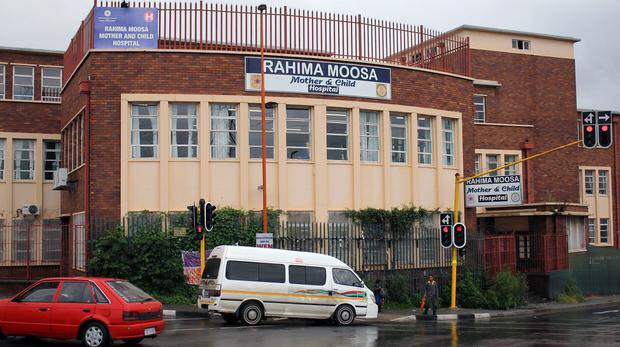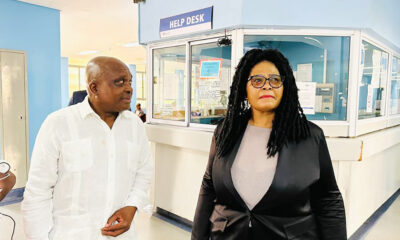
News

Waterless hospitals highlight health risks and delays
As taps ran dry at several Gauteng public hospitals, doctors and healthcare workers, many of them Jewish, have had to dig deep to push through the stench in their commitment to delivering healthcare and saving lives.
Health facilities such as Rahima Moosa Mother and Child Hospital, Helen Joseph Hospital, and Pholosong Hospital in Ekurhuleni have experienced water supply interruptions, some continuing for days. Residents in affected areas have also been frustrated by water cuts and low water pressure.
The Gauteng Department of Health (GDoH)said these latest interruptions were due to “various challenges experienced by the water utilities, Rand Water, and Johannesburg Water and the respective municipalities”.
Hospitals have reservoirs and some have boreholes as part of the back-up system when there are supply disruptions. “However, the system becomes strained when the interruptions are prolonged,” said GDoH head of communications, Motalatale Modiba.
Johannesburg Water and Rand Water say multiple reservoirs are under strain.
One Jewish doctor at Rahima Moosa, who asked to remain anonymous, said the smell got so bad, he’d do anything to avoid using the toilet.
“The toilets don’t flush when there’s no water, so it just sits there, it’s gross,” he said.
However in spite of this, he said these latest challenges weren’t “the end of the world”. It was business as usual for healthcare workers, who “just got on with the business of the day”.
“The water issue is an ongoing thing, we just make a plan,” he said, and the hospital did its best to provide contingency measures. Johannesburg Water despatched water tankers to the health facilities to mitigate the impact on services.
The water disruptions, he said, affected different wards differently as there were one or two wards which had working taps while most of the taps were dry. “This situation, although mostly an inconvenience, has prompted creative solutions for handwashing, using bottled water and frequent hand sanitation.
“However, there are occasional mishaps when individuals forget about the water situation and realise it only after applying soap, or when you want to boil the kettle and it’s empty.
“Some days unexpected floods occur as the water supply returns overnight and taps have mistakenly been left open,” he said.
This necessitates a rush to mop floors, use towels to absorb water, and redirect patients while waiting for areas to dry. These interruptions also result in longer instrument cleaning times, causing a backlog in the operating theatre, the doctor said.
Without water, thorough handwashing and scrubbing before and after surgeries becomes challenging, leading to requests for staff to bring five litre bottles of water to work or to use an external tap, he said.
Jack Bloom, the Democratic Alliance Gauteng Shadow Health MEC, said the water cuts highlighted the “urgent need for water resilience measures” at Gauteng public hospitals.
“Hospitals should never run out of water as it shoots up the risk of infection and disease. It’s also distressing for patients, and surgery backlogs rise when operations are cancelled.
“With the latest water cuts, the toilets became smelly, and relatives had to bring in water when visiting their loved ones,” Bloom said.
Water resilience measures should include increased reserve water storage, the digging of internal boreholes, regular maintenance of water pipes, and pumps to get water to higher floors when water pressure is low.
“Every hospital needs a water plan in our new reality in which flowing water can no longer be taken for granted,” Bloom said.
Another doctor, who recently worked at Helen Joseph, said the water supply interruptions weren’t new, yet there was still no evidence of advance planning to ameliorate water shortages.
“I’ll never forget the recent sight that greeted me in the parking lot one morning when I arrived for work. There was a gathering of nurses queuing at one working tap outside the building, each holding a bucket to fill with water. It breaks my heart. It seems like this whole area of Johannesburg is being forgotten about in terms of service delivery and infrastructure,” he said.
“Hygiene is the most important thing in a hospital. I wash my hands after every procedure and to go outside to do this at a tap is time consuming, never mind totally insane. Helen Joseph has a superb emergency department which will be greatly enhanced by the new casualty complex being built, but a hospital cannot function optimally without water. You cannot operate, you cannot sterilise, and patients cannot bath and clean themselves.
“Doctors and nurses go home at the end of a shift, what about the poor patients who can’t even flush the toilets. It’s disgusting. For colleagues who live at the hospital residences set up for doctors and nurses, going home after a long shift and not being able to shower isn’t a joke.”
At Edenvale Hospital, another doctor recounted the impact on patients a few weeks ago, when the hospital grappled with water interruptions caused by a burst water pipe and low water pressure, impacting most wards. For example, in the paediatric ward, there were infants in need of sterilised bottles and water for formula preparation.
The situation raised concerns about the potential transmission of infection among patients, especially those suffering from gastroenteritis or diarrhoea. To cope, the hospital implemented contingency plans, but there were moments when doctors resorted to using limited IV fluid for handwashing, staff collected water from an external tank using buckets, and large bins were filled with water for various purposes.
She recalled a challenging incident when she struggled to transfer water from a sizeable container for toilet use and hand hygiene. In the process, she accidentally spilled water. “I then had to locate a mop to clean the floors.”
Earlier this week, the GDoH announced that though the water supply had stabilised at the three affected hospitals, the supply problem wasn’t “completely resolved”.
“The department will continue working with the relevant stakeholders to improve its capacity and infrastructure to ensure that health services continue to be rendered even when there are service interruptions,” said Modiba.










